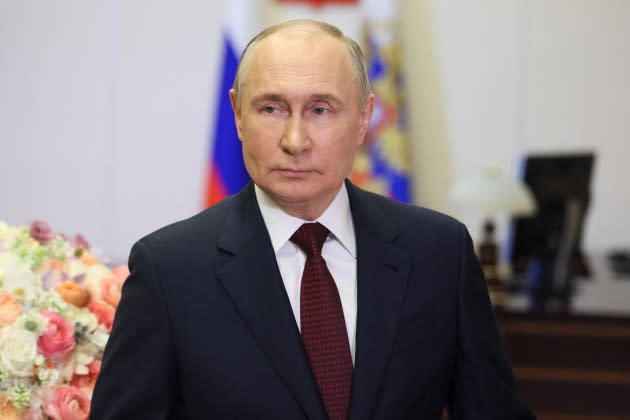New Netflix Doc Asks If Putin Restarted the Cold War — Or If It Ever Ended in the First Place
- Oops!Something went wrong.Please try again later.

And the award for good timing goes to Netflix. In the wake of Oppenheimer’s inevitable Oscar coronation Sunday night, a celebration of a movie about the tormented father of the atomic bomb and the world he helped create, the mega-streamer has dropped Turning Point: The Bomb and the Cold War, which includes an extensive account of the events leading up to the Manhattan Project, the atomic testing at Los Alamos, the annihilation of Hiroshima and Nagasaki, and the arms race that defined the second half of the Twentieth Century.
But Turning Point is far more than a documentary gloss on the year’s most decorated movie. It’s an exhaustive, immensely ambitious nine-part, ten-hour series that covers the Cold War from before the beginning (the Russian Revolution) to after the end (the Russian invasion of Ukraine). Or did it ever end? As national-security journalist Garrett Graff puts it in the series, “If you open the newspaper on any given day, we’re still living with the aftermath of the Cold War.” The original Cold War may have wrapped up with the fall of the Berlin Wall in 1989 and the rise of Perestroika, but it has revived as Russian President Vladimir Putin resuscitated the country’s aggressive nationalist spirit when he was elected Russian president on the last day of 1999.
More from Rolling Stone
However you define the Cold War’s parameters, Turning Point is a mighty feat of historical documentary storytelling. Directed by Brian Knappenberger, who also helmed Netflix’s Turning Point: 9/11 and the War on Terror, the series combines the veracity and thoroughness of a Frontline installment with the style (and, by all appearances, the budget) of a major documentary release. (Among the executive producers is longtime Frontline producer Lowell Bergman).
It weaves in everyone from Daniel Ellsberg, the Pentagon Papers leaker interviewed by the filmmakers before who died last year, to Ukrainian President Volodymyr Zelenskyy, who took a break from fighting Russia to sit for the cameras and reiterate what he’s been saying for two years: that he never wanted war but isn’t about to lay down and surrender. It makes way for distinguished historians and authors, including Graff, Mary Elise Sarotte (The Collapse), and Stephen Kinzer (Overthrow). Perhaps most importantly, it makes clear that the possibility of nuclear war is still very much alive, especially with Putin taking every opportunity of late to remind the world that he’ll deploy nukes if and when he damn well feels like it. Elizabeth Eaves, contributing editor of the Bulletin of Atomic Scientists, puts it this way: “Is a nuclear war a low probability? Sure. But if we keep the weapons around, we’re gonna have one.”
This is a series that makes you feel smarter for watching it. Here in one place are detailed accounts of the murderous rise of Stalin; the execution of the Rosenbergs; the scourge of McCarthyism; the gallows humor of Dr. Strangelove (which Ellsberg, feeling his oats as he approached his death, cheekily deems “a documentary”); the Bay of Pigs and Cuban Missile Crisis (remember, kids, duck and cover); and the creation of the CIA, which sponsored bloody coups in Iran and Guatemala, among other places, using the mere possibility of Communist expansion as justification. Turning Point makes abundantly clear that both super powers did plenty of dirty Cold War deeds, and that none of them were dirt cheap, as a glance at the American nuclear bill will attest.
It also connects the past to the present in a way that should give everyone pause. When Russia uses the internet to foster dissent among American voters it’s working from an old playbook of both the KGB and the CIA, which did plenty of damage with the tools of old media. The series deftly illustrates that Putin’s contempt for democracy, and his compulsion to vault Russia into a ruthless new golden age, crush dissent, and stay in power indefinitely, follows a pattern that has more in common with Stalin than, say, Brezhnev. He is determined to Make Russia Great Again. It’s no wonder Donald Trump is a fan.
Turning Point: The Bomb and the Cold War makes a fine companion to another recent quality Netflix offering, Einstein and the Bomb. But that was an appetizer. This is a nine-course meal. Netflix has the clout and the cash to do this kind of thing more often. Here’s hoping they keep using it.
Best of Rolling Stone
